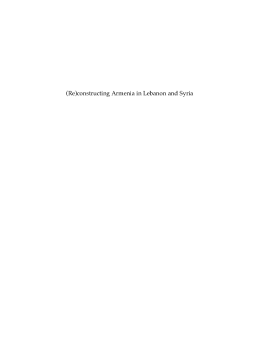
Additional Information
Book Details
Abstract
For almost nine decades, since their mass-resettlement to the Levant in the wake of the Genocide and First World War, the Armenian communities of Lebanon and Syria appear to have successfully maintained a distinct identity as an ethno-culturally diverse group, in spite of representing a small non-Arab and Christian minority within a very different, mostly Arab and Muslim environment. The author shows that, while in Lebanon the state has facilitated the development of an extensive and effective system of Armenian ethno-cultural preservation, in Syria the emergence of centralizing, authoritarian regimes in the 1950s and 1960s has severely damaged the autonomy and cultural diversity of the Armenian community. Since 1970, the coming to power of the Asad family has contributed to a partial recovery of Armenian ethno-cultural diversity, as the community seems to have developed some form of tacit arrangement with the regime. In Lebanon, on the other hand, the Armenian community suffered the consequences of the recurrent breakdown of the consociational arrangement that regulates public life. In both cases the survival of Armenian cultural distinctiveness seems to be connected, rather incidentally, with the continuing ‘search for legitimacy’ of the state.
Nicola Migliorino earned his PhD from the Institute of Arab and Islamic Studies, University of Exeter. His research has focused on Lebanon, Syria, and questions concerning ethno-cultural diversity in the contemporary Arab world. Between 1998 and 2000 he worked for an international NGO assisting Palestine refugees in Syria. He is currently Assistant Professor in International Studies at Al Akhawayn University in Ifrane, Morocco, and Honorary Research Fellow at the Institute of Arab and Islamic Studies, University of Exeter.
"... an impressively researched account of one of the major refugee crises of the 20th century ... Migliorino offers a thoughtful account of the Armenian refugees' experience, focusing on religion, cultural production, and communal political organization and covering 1923-2003, a span of three or four generations. This is an analytical narrative of the making of a society, from refugees to citizens… this fine historical account is also an exemplary developmental study of the ways in which refugees create a permanent diaspora society. Relevant to all social scientists. Highly recommended." · Choice
